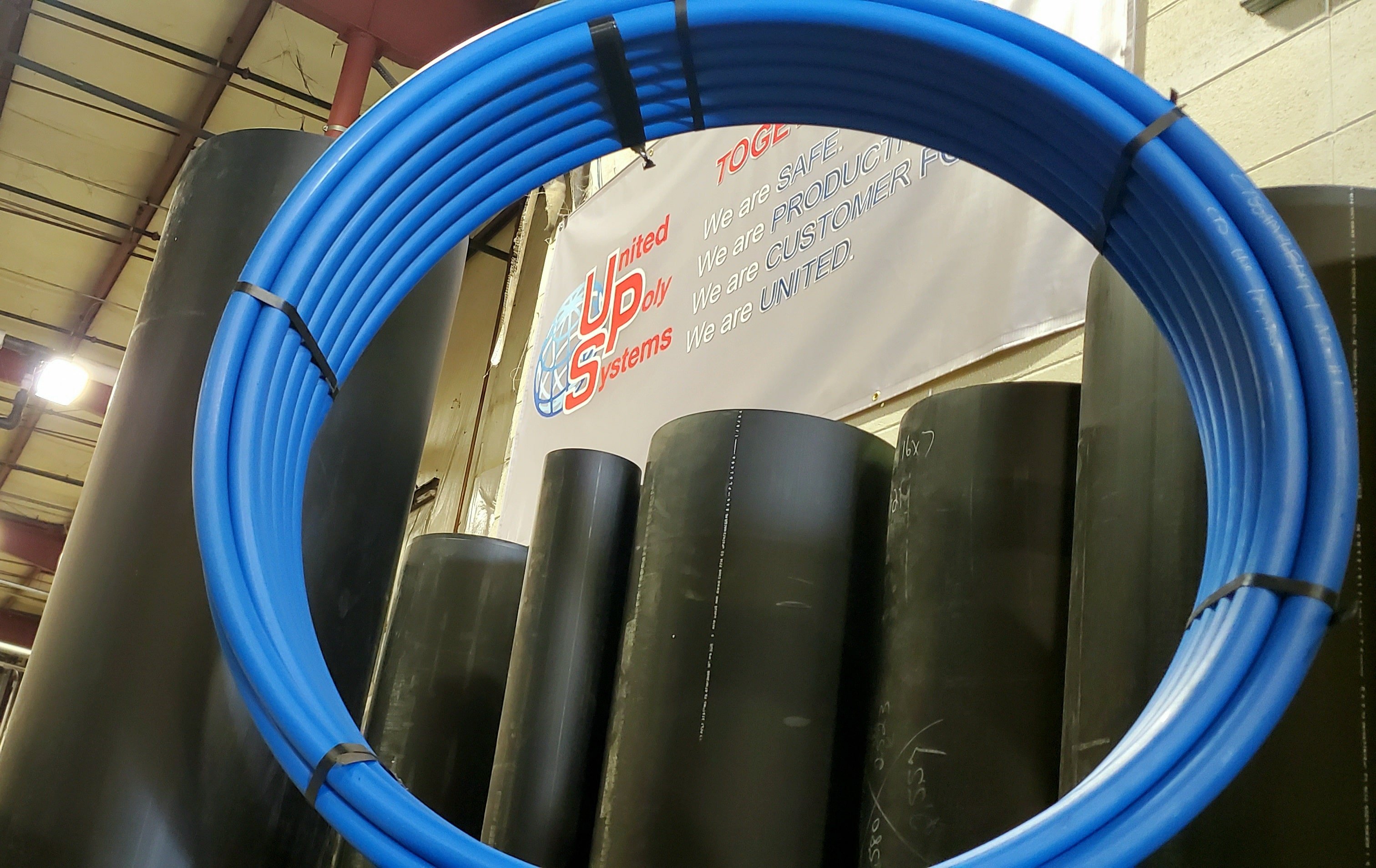The Advancement of American Plastics HDPE Pipe Manufacturing: What You Need to Know
Wiki Article
Recognizing the Secret Perks of HDPE Pipeline for Water and Wastewater Administration
Using HDPE pipe in water and wastewater monitoring offers many advantages that warrant factor to consider. Its phenomenal longevity and long lifespan make it a preferred option for many jobs. Furthermore, the product's resistance to deterioration and chemical damages improves its reliability in numerous environments. However, the advantages expand past just durability and resistance. Exploring its cost-effectiveness and ecological effect discloses even more engaging factors for its widespread adoption in contemporary facilitiesPhenomenal Toughness and Long Life

HDPE pipe stands out for its phenomenal longevity and long life, making it a preferred selection in water administration systems. Constructed from high-density polyethylene, these pipelines can hold up against significant pressure and stress and anxiety, ensuring trustworthy performance in time. Their durable nature allows them to endure severe environmental conditions, consisting of temperature level changes and soil activities, which can create other materials to fail.
The lifespan of HDPE pipes usually exceeds 50 years, offering an affordable service for communities and markets alike. Furthermore, the product's light-weight homes streamline installation, decreasing labor prices and durations. This durability lessens the requirement for constant fixings or substitutes, further boosting its financial allure.
In water administration applications, the dependability of HDPE pipes implies less interruptions and improved service continuity, making them important to lasting facilities growth. The mix of toughness and longevity solidifies HDPE's function as a cornerstone in efficient water administration options.

Resistance to Corrosion and Chemical Damage
While several products catch rust and chemical damage gradually, HDPE pipelines show exceptional resistance, making them optimal for different water management applications. This strength comes from the molecular structure of high-density polyethylene, which is inherently non-reactive and does not rust like steels or degrade from direct exposure to harsh chemicals. Therefore, HDPE is highly effective in atmospheres with hostile compounds, such as wastewater systems that may have acids, bases, and organic solvents.
Additionally, HDPE pipes can withstand ecological aspects such as soil level of acidity and saline conditions, even more improving their viability for diverse applications (American Plastics HDPE Pipe for Oilfield). Their capability to maintain structural honesty in time reduces the risk of leaks and failures, which is critical in making certain the safety and reliability of water distribution and wastewater management systems. The resistance to corrosion and chemical damage noticeably contributes to the general performance and long life of HDPE piping services.
Cost-Effectiveness and Economic Advantages
When taking into consideration the economic effects of water administration systems, the cost-effectiveness of HDPE pipelines ends up being apparent. These pipes supply lower installment and upkeep costs contrasted to typical products like steel or concrete. Their lightweight nature streamlines transport and installation, causing minimized labor expenditures. Additionally, HDPE pipes exhibit a long life expectancy, often exceeding 50 years, which equates to fewer substitutes and lasting cost savings.Additionally, the resistance of HDPE to additional resources corrosion and chemical damage lessens the requirement for pricey repair services and substitutes. The pipelines also sustain reliable water circulation, reducing power prices associated with pumping systems. By mitigating leaks and water loss, HDPE pipelines add to substantial economic advantages for towns and sectors alike. On the whole, the initial investment in HDPE piping can generate significant monetary returns over the life-span of the water monitoring system, making it a sensible choice for lasting framework advancement.
Environmental Sustainability and Reduced Impact

Convenience and Flexibility in Setup
Since of their distinct buildings, HDPE pipelines provide remarkable convenience and adaptability in installment, making them ideal for a wide variety of applications. Their lightweight nature allows for simpler handling and transport, decreasing labor prices and installation time. HDPE pipelines can be curved and formed to fit various terrains and my sources project needs, which is specifically advantageous in challenging atmospheres.Additionally, their resistance to deterioration and chemical damage enables installment in varied setups without the requirement for specialized safety coatings. The capacity to fuse joints develops a continuous, leak-free system, boosting the overall honesty and integrity of the installment. HDPE's versatility likewise fits ground motion, decreasing the risk of damages in locations susceptible to shifting dirt. On the whole, these features make HDPE pipelines not just versatile but also a favored option for water and wastewater management systems.
Frequently Asked Questions
How Does HDPE Pipeline Compare to PVC in Water Monitoring Applications?
HDPE pipeline supplies premium flexibility, resistance to corrosion, and durability compared to PVC. Its lighter weight helps with simpler installation, while its long lifespan minimizes substitute prices, making HDPE a recommended option in water administration applications.What Is the Lifespan of HDPE Pipes Under Typical Problems?
Under normal conditions, HDPE pipes can have a lifespan varying from 50 to 100 years. Their resilience and resistance to deterioration contribute to their long-lasting performance in different applications, making them a reliable choice for framework.Are HDPE Water Lines Recyclable After Their Life Span?
Yes, HDPE pipelines are recyclable after their solution life. hdpe pipe suppliers Midland TX. They can be refined and repurposed right into brand-new items, substantially reducing environmental impact and advertising sustainability within the industry, making them an environmentally friendly selection for piping optionsWhat Is the Installment Refine for HDPE Piping?
The setup procedure for HDPE pipes involves website prep work, trenching, pipeline combination or mechanical joining, backfilling, and stress testing. Proper strategies guarantee a dielectric nipple resilient and effective system for carrying water and wastewater properly.Can HDPE Piping Be Made Use Of for Both Potable and Non-Potable Water Systems?
Yes, HDPE pipes can be used for both potable and non-potable water systems. Their versatility, resilience, and resistance to corrosion make them suitable for various applications, making sure secure and efficient transportation of water in various contexts.Report this wiki page